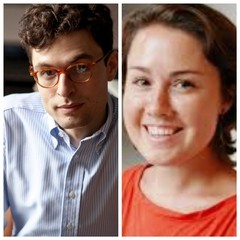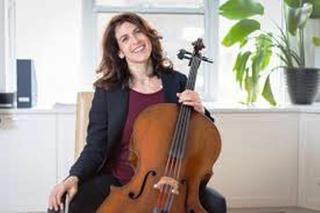|
Back
The Joys of Time-Travel New York
Grace Rainey Rogers Auditorium, Metropolitan Museum of Art
04/21/2018 -
“Time Travelers To Versailles”:
Timo Andres: Upstate Obscura (World Premiere)
Caroline Shaw: Clockwork 1793 (World Premiere)
Marc-Antoine Charpentier: Les Plaisirs de Versailles
Inbal Segev (Cello), Jolle Greenleaf (Artistic Director and soprano), TENET: Virginia Warnken Kelsey, Elisa Sutherland (Mezzo-sopranos), Abigail Haynes Lennox (Soprano), Marc Molomot (Tenor), Jesse Blumberg (Baritone), Beth Wenstrom, Johanna Novrom (Violins), Ezra Seltzer (Cello), Wen Uyang (Viola da Gamba), Hank Hejink (Theorbo), Jeff Grossman (Harpsichord), Andrew Cyr (Artistic Director and Conductor), Metropolis Ensemble

T. Andres/C. Shaw (© Courtesy of the Artists)
“Versailles! Your brain goes giddy...and you half believe you are the dupe of an exquisite dream. The scene thrills like military music.”
Mark Twain, The Innocents Abroad, 1869
“The great front is a lumber of littlenesses…The rooms are all small except for the Great Gallery...The garden is littered with statues...Such was Louis XIV left to the pursuit of his puerile ideas of glory.”
Horace Walpole (1739)
The questionable glory of Versailles, built to keep the Government of France from having to mix with the French proletariat riffraff, is being celebrated by the Metropolitan Museum of Art through July 29. Not just in the artefacts and drawings and reproductions of the Palace and its grounds, but its place in international literature and lore...
And music, of course. Louis loved dancing and masques and grand celebrations for himself, with Charpentier and Lully as the leading composers. And the Met has naturally scheduled two operas on May 3, by Italian-born Jean-Baptiste Lully and Belgium-born André Grétry.
Last night, though, the very imaginative producer Andrew Cyr gave the chance for two of America’s finest young composers to create music for “their” Versailles, and the results were fascinating.
True, Timo Andres confessed to never having visited Versailles (he was inspired by the panoramic picture of Versailles by American John Vanderlyn). Then again, Franz Kafka never visited Amerika, so this is no impairment.
Caroline Shaw takes Louis’ despotic adherence to temporal rules and regulations, and–like the Sultans of Morocco–his obsessions with timepieces. The work was called Clockwork 1793, and while the date was strangely anachronistic (the Parisian riffraff were running rampage and riots at that time) her own allegiance to a famous clock was stunning.
Back to Mr. Andres. His Upstate Obscura was the name for a cello concerto, ending a week of cello virtuosi. Yo-Yo Ma was, as always, stunning. Andrei Ionită was cool and precise. Last night, though Inbal Segev beat them all with a cello that more than glowed: it had the brightness and flames of a thousand Versailles flambeaux in the grand gardens, lighting the Grace Rainey Auditorium.
Mr. Andres’ piece was made for such dazzling sounds. He had offered, in the program notes, a detailed description of the painter’s 360-degree panorama, yet described the painting as more American than French. Thus, New Englander Andres attempted to take “stretched out fragments of the French Baroque tradition”, transforming them in three fairly long movements.

I. Segev
Whatever his verbal projection, Upstate Obscura came out as a grandly romantic cello concerto. The composer might not like this, but one felt the shadow of Samuel Barber each time Ms. Segev created her drawn-out melodies, even ascending to a grand 1950’s American-style crescendo climax.
Then again, nothing is quite what it seems with this composer. Like his Third Piano Concerto, this emotional transparency is a cover for some exquisite orchestration. He can show a fragmented mirror with subtle harp, vibraphone and piano. His cello picture of a woman walking down a long staircase is more like a Seurat painting, the steps themselves echoing upon themselves. And the solemn ending was like a benediction.
So yes, this was a work to be wondered at, to hear again, to put his description of Versailles qua Americana with the luscious tones of the solo instrument.
Following this was Caroline Shaw’s Clockwork 1793, this actually written with 17th Century instruments–and a trio of female singers who were part Sirens, part, Greek Chorus, part Andrews Sisters, part...er, shopping network.
Half the duration of Mr. Andres’ work, Clockwork 1793 used its musical language sparingly and well. The work started with a single note on the keyboard. Repeated, augmented with a plucked cello note, then slightly distended, and then the three glorious singers–Virginia Warnken Kelsey, Abigail Haynes Lennox and Elisa Sutherland–proclaimed times of day and gifts for the Monarch. (In 1793, the only gift would be the guillotine...but ça ne fait rien).
They varied from consonance to dissonance to single notes, like clocks chiming, The ensemble went back and forth from ancient theorbo sounds to modern chamber sounds. Yet Ms. Shaw kept the whole piece going like clockwork until...
Until its sudden end. I wished it could have continued longer, but Caroline Shaw is not a composer who outstays her welcome. And welcome she always is.
The finale was a gorgeous surprise. I had heard the Boston Early Music ensemble perform this a few years ago, but Marc-Antoine Charpentier’s Les Plaisirs de Versailles is always far more fun than its prosaic title.
What we have here (to quote Cool Hand Luke) is a failure to communicate. But with mirth rather than menace. The Goddess of Music, Jolle Greenleaf, singing with little vibrato, a soporific ditty, tells how music solves all ills, is the choice of connoisseurs. Into her life comes the lively Goddess of Conversation, Virginia Warnken Kelsey, giving her the verbal finger, telling Miss Goody-Two-Shoes to shut her trap. And trying to negotiate are Gods of ”Play” and “Pleasure” offering chocolate, wine, games, and food as substitutes for them both.
It is a wonderful invention. Neither masque nor opera, not tragedy, not comedy. And it was played to the hilt. Not over-played, but with the joy of the Versailles Court. And perhaps with a technical precision and lighthearted abandon which one doubts existed four centuries ago.
And just in case it didn’t please Louis XIV, well, at the end, we had a prayer honoring the Sun God. I have no idea what a Monarch does when all the singers tell him he’s the King of the Universe. But hey, this was Versailles. And until the peasants opened the gates of Bastille, they lived their sheltered lives, danced and sung, and–like us last night–had an invigorating Fête Complete
Harry Rolnick
|